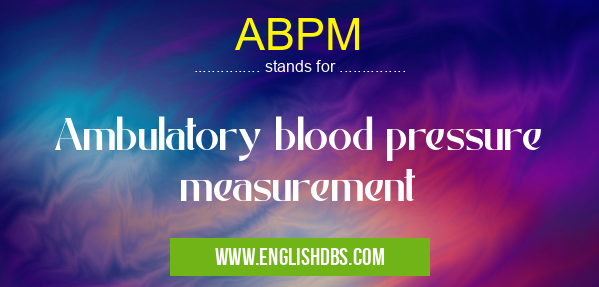What does ABPM mean in NURSING
Ambulatory blood pressure measurement (ABPM) is an important tool used in medical diagnosis and research. It helps to detect, diagnose and monitor any changes in the blood pressure of an individual over a longer period of time. ABPM provides a more accurate assessment of the individual’s cardiac health than standard clinical measurements that are taken only once every visit. The measurement allows providers to identify any subtle or hidden trends in the patient’s blood pressure profile that may indicate cardiovascular disease, stroke, hypertension or other serious health conditions. By measuring each patient’s unique variations in blood pressure, physicians can develop treatments more accurately tailored to their individual needs.

ABPM meaning in Nursing in Medical
ABPM mostly used in an acronym Nursing in Category Medical that means Ambulatory blood pressure measurement
Shorthand: ABPM,
Full Form: Ambulatory blood pressure measurement
For more information of "Ambulatory blood pressure measurement", see the section below.
Benefits of ABPM
The main benefit of Ambulatory Blood Pressure Measurement is its ability to provide better insights into individual patients' health than short-term clinical measurements do. By giving doctors an extended view into fluctuations in a person's blood pressure, they can better understand which treatments will be most effective in managing their condition and preventing further complications from developing. Additionally, this method can help identify any hidden risk factors for stroke or heart attack that may not have been detected through regular office visits alone. Finally, with ambulatory monitoring, medications can be adjusted more quickly if needed since changes become apparent over time rather than waiting until the next scheduled appointment.
Essential Questions and Answers on Ambulatory blood pressure measurement in "MEDICAL»NURSING"
What is ABPM?
Ambulatory blood pressure monitoring (ABPM) is a method used for measuring a person's blood pressure while they go about their normal daily routine. It is usually done over a 24 hour period, and involves the use of an automatic device which records the person's blood pressure at regular intervals.
What are the benefits of ABPM?
ABPM provides doctors with accurate information about a person’s true state of health as it measures their blood pressure at different times rather than in an isolated clinic visit. It also gives information on what could be causing high or low readings, such as stress or physical activity levels, providing better guidance on how to treat the condition.
Who should get an ABPM?
People who have been diagnosed with certain conditions such as hypertension, diabetes, kidney disease, and other cardiovascular diseases are more likely to benefit from having an ABPM done by their doctor. These readings can help determine the effectiveness of medications prescribed by giving insight into overall patterns in blood pressure levels throughout day-to-day activities.
Is there any discomfort associated with having an ABPM?
Generally no, but some people may experience slight discomfort from wearing the device for long periods of time. The sensor will be attached to your arm using a cuff that inflates and deflates according to the set measurement schedule, which could cause some mild discomfort at these moments.
How accurate is ABPM compared to conventional sphygmomanometer measurements?
An ABPM will provide more accurate results since it takes multiple readings throughout the day rather than relying on one single reading in a clinical setting. The device measures much more data over longer periods of time leading to more accurate results compared to conventional methods.
What should I do before getting my blood pressure checked with an ABPM?
You should inform your doctor if you have taken any medication prior to your appointment so that they can make appropriate adjustments if necessary. Also try and keep your daily routine as consistent as possible in order to receive precise readings from the machine.
How long does it take to perform an ABPM test?
Typically most tests take around 24 hours for completion; however this can vary depending on individual patient circumstances and needs.
Are there any side effects associated with undergoing an ABPM test?
No significant side effects have been reported after completing this type of test other than minor discomfort due to wearing the cuff for prolonged periods of time.
Final Words:
In summary, Ambulatory Blood Pressure Measurement (ABPM) is an important tool used in medical diagnosis and research as it provides healthcare professionals with deeper insights into a patient's cardiovascular health than traditional methods do so they are better able to implement targeted treatments for improved outcomes. It is also useful for identifying hidden risk factors that may otherwise go undetected and adjusting medications quickly if needed to prevent further complications from developing.
